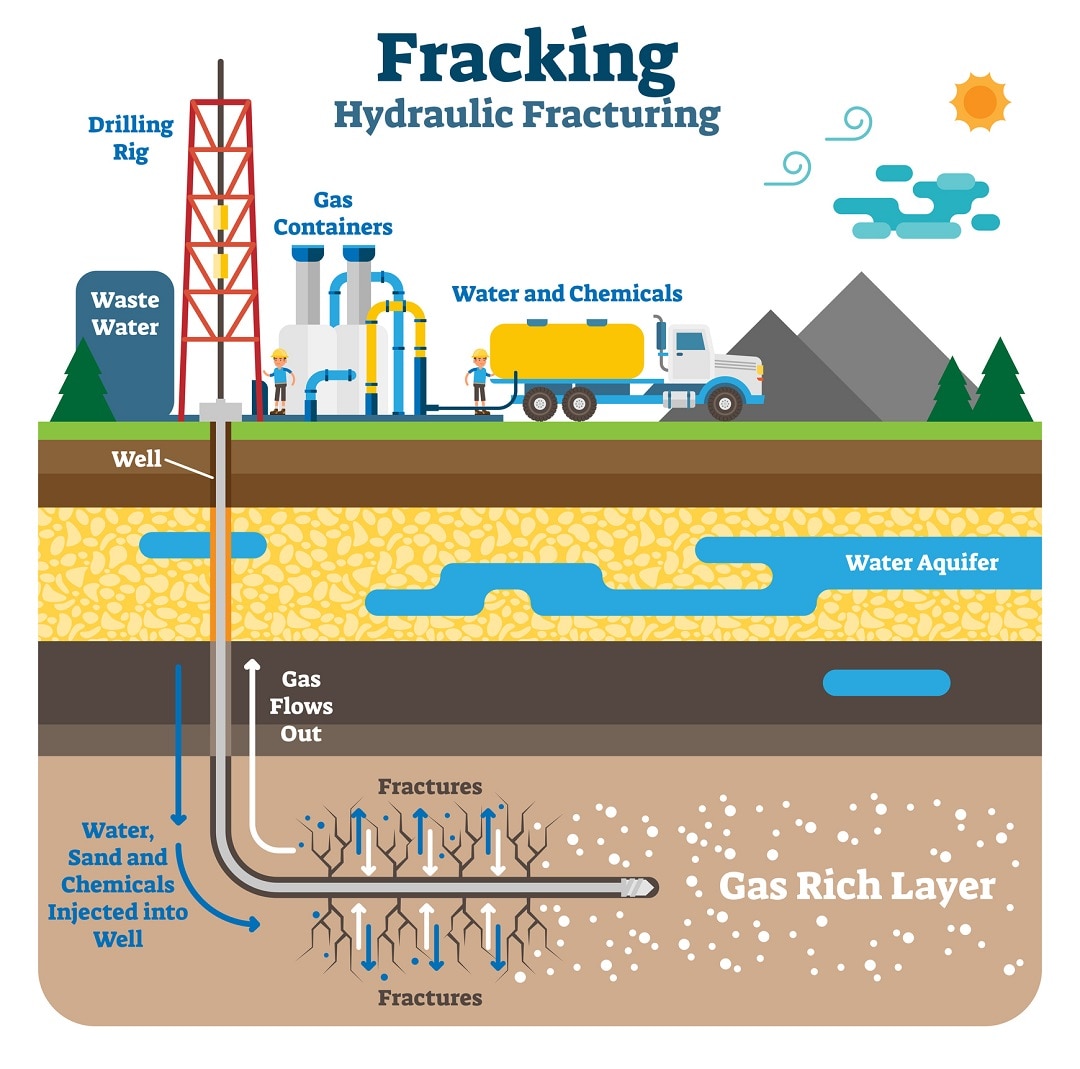What are the two laws of thermodynamics?
Provide an example if possible.
Energy cannot be created or destroyed in an isolated system: energy, however, can be converted and transferred.
"The entropy of any isolated system always increases." --Put quite simply, it's saying that energy transfers are never 100% efficient--some energy is lost through heat.
Oil: What are the pros and cons? What can be done to reduce or to avoid the issues posed by the extraction and processing of oil?
Pros: Mature technology, Reliable
Cons: Drilling operation disrupts wildlife habitat, Impacts the landscape through the removal of vegetation and increase of erosion, which leads to landslides and floods, Emits CO2, CO, and other air pollutants, Methane is produced during fracking, Oil spills, urban runoffs, natural seeps have an impact on animals, Pollutes water, Improper disposal of oils, and Non-renewable
Biofuels (Biologically produced ethanol; biomass): What are the pros and cons? What benefits might biofuels provide? What can be done to reduce or to avoid the issues posed by the usage of biofuels?
Pros: Made from different sources (ethanol, biodiesel, biomass, wood chips, municipal waste, among others)Pollute less than fossil fuels during burningCheaper to produce than fossil fuelsRenewable energy sourceCan be produced by any country
Cons: Emissions include CO2, CO, and sulfur, Biodiesel creates more nitrogen oxide than diesel from petroleum, Ashes from biofuels may contain harmful metals, such as cadmium and lead, A great amount of energy and water is necessary to grow crops, produce fertilizers and pesticides, and transform plants into biofuel, Less efficient than fossil fuels, A great amount of the energy used to produce biofuels comes from fossil fuels, Although they have less carbon footprint, biofuels increase footprint through cultivation and harvest of crop, in addition to the destruction of forests for crop plantation, and Currently, production costs are more than that of fossil fuel
Fracking has a lot of aspects that eventually leave an impact on the environment.
How exactly do those procedures leave an impact, and is there a way to reduce the effects/risk of using and obtaining energy sources by fracking?
Note: This question not only is served to identify the pros and cons: additionally, apply those effects to what would happen in the environment.
Define Renewable Energy, explain the pros and cons of renewable energy, and give examples of how it works and what sources are utilized.
Renewable energy: Energy made from sources that can rapidly regenerate/replenish and can never be depleted, no matter how much of them we use. Renewable energy is key to sustainability, as there are no worries regarding whether the supply will run out or not.
Natural Gas: What are the pros and cons? What can be done to reduce or to avoid the issues posed by the extraction and processing of natural gas?
Pros: It is abundant and a major source of energy, Is a relatively clean fossil fuel (IN COMPARISON WITH COAL), Is relatively cheap, Is a huge employer, and can be considered as a "bridge" fuel for a growing renewable energy economy
Cons: Natural gas is a powerful greenhouse gas (Methane), Natural gas is a nonrenewable resource, Structural failures cause leaks and flaring, leading to higher greenhouse gas emissions, Fracking poses substantial environmental concerns, and Aging infrastructure poses ongoing dangers
Wind Energy: What are the pros and cons? What benefits might wind energy provide? What can be done to reduce or to avoid the issues posed by the usage of wind energy?
Pros: Clean energy source, Does not pollute air or water, Renewable and sustainable energy, Fuel is free and available worldwide, and Produces negligible air or water pollution. Turbine manufacturing and installation are the only process steps that emit greenhouse gases, Space-efficient, Low operating costs, Great potential for powering homes
Cons: Intermittent and unpredictable, May result in the deaths of bats and birds, High upfront investment, Noise and visual pollution, and Biological impacts
What is Natural Gas and how does it compare to Oil?
How does Natural Gas compare to other non-renewable sources?
Basically here the question is to compare the pros and cons of each energy source to see which ones can be better applied in certain situations.
Here is the comparison between natural gas production/delivery and coal production/delivery:


Define Non-Renewable Energy, explain the pros and cons of non-renewable energy, and give examples of how it works and what sources are utilized.
Non-renewable energy: Energy made by a source that exists in limited quantities and once used, cannot be replaced except over the course of millions of years. Sources will eventually run out, and the majority of non-renewable energy sources are expensive--both environmentally and economically--to access and use.
Coal: What are the pros and cons? What can be done to reduce or to avoid the issues posed by the extraction and processing of coal?
Pros: It is abundant and inexpensive, “Clean coal” technology can remove harmful material before it reaches the environment
Cons: There is an impact on environment, Can potentially pollute the air, soil, and water bodies, The burning of coal emits CO2, SO2, toxic heavy metals, cadmium, arsenic, and mercury, “Clean Coal” involves costs, Coal source is finite, Byproducts of coal mining include arsenic, SO2, selenium, and mercury
Hydropower (both Tidal and Dams): What are the pros and cons? What benefits might hydropower provide? What can be done to reduce or to avoid the issues posed by the usage of hydropower?
TIDAL
Pros: Does not emit greenhouse gases, Renewable, Predictable, Effective even at low speeds, Long life span, Serves as coastal protection against dangerous tides generated during storms
Cons: Environmental effects potentially similar to those of hydroelectric dams, Intermittent source of energy (~10 h/day), May disturb natural movement/migration of fish, It is expensive and not cost-effective, Needs to be close to the shore, It is a new technology and requires more research and a large amount of funding, Currently cannot compete with fossil fuel energy
HYDROPOWER
Pros: Does not pollute water or air, Renewable, reliable, flexible
Cons: Forces relocation of people and animals, May change the temperature and flow of water, May cause low level of dissolved oxygen in the water, Disturb river habitats and fish populations, May create methane, Expensive, Affected by droughts
Energy usage trends in countries (Which countries use the most of X, Y, Z? and why are countries using similar sources?

What are some methods used for energy conservation? This refers to the processing of materials for energy, the literal energy efficiency of the material or how it's being processed, and how to use less energy.
[DISCUSSION]
(Don't forget about cogeneration, government laws/taxes/tax cuts and incentives, etc.)
Nuclear: What are the pros and cons? What can be done to reduce or to avoid the issues posed by the extraction of resources and the refinement of Nuclear?
Pros: Insignificant carbon emissions, More efficient and reliable than fossil fuel, and Low operating cost
Cons: High environmental impact, Generates radioactive waste, Nuclear accidents can pose serious health effects, High startup costs, Uranium is a finite, non-renewable resource, Potential target for terrorist activities, Use high amounts of water for the production of steam and system cooling, Wastewater from power plants may contain pollutants
Solar (Photovoltaic Cells, Solar Towers, Passive-Solar): What are the pros and cons? What benefits might solar energy provide? What can be done to reduce or to avoid the issues posed by the usage of solar energy?
Bonus Points if you can name the pros and cons in regards to the different technologies that solar power utilizes
Pros: Abundant, renewable, and sustainable source, Does not pollute the air or water, Available worldwide, Silent, Low maintenance
Cons: High upfront investment, Intermittent, Solar panel production emits hexafluoroethane (C2F6), nitrogen trifluoride(NF3) and sulfur hexafluoride (SF6), which are very potent greenhouse gases (based on a 100-year time horizon, their ability to trap extra heat in the atmosphere over time is about 12,200; 17,200; and 22,800 times more than that of CO2, respectively) [1], Certain solar cells require expensive and rare materials, such as copper indium gallium selenide (CIGS) and cadmium telluride (CdTe), Requires large space
What are the cultural and environmental risks posed by the Dakota Access Pipeline?

I hope you take the time to mourn what my search history has become in order to find a good energy meme.
What caused the current energy crisis in Texas?
(Better yet, what wasn't the actual culprit?)
Natural gas and Coal failures were what caused it
NOT WIND TURBINES!!!
Congratulations, Texas, you made me break the symmetrical shape of this review.
Geothermal Energy: What are the pros and cons? What benefits might geothermal energy provide? What can be done to reduce or to avoid the issues posed by the usage of geothermal energy?
Pros: Renewable resource, Creates smaller amounts of CO2 and sulfur components than fossil fuels, Great for heating and cooling, Its use does not burn fuels, Has a small footprint on the land, Reliable and predictable source of energy
Cons: In extreme cases, geothermal power plants may cause earthquakes, Heavy upfront costs, Sustainable only if reservoirs are properly managed
